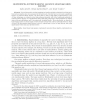Free Online Productivity Tools
i2Speak
i2Symbol
i2OCR
iTex2Img
iWeb2Print
iWeb2Shot
i2Type
iPdf2Split
iPdf2Merge
i2Bopomofo
i2Arabic
i2Style
i2Image
i2PDF
iLatex2Rtf
Sci2ools
103
click to vote
SIAMSC
2010
2010
Blendenpik: Supercharging LAPACK's Least-Squares Solver
Abstract. Several innovative random-sampling and random-mixing techniques for solving problems in linear algebra have been proposed in the last decade, but they have not yet made a significant impact on numerical linear algebra. We show that by using a high-quality implementation of one of these techniques, we obtain a solver that performs extremely well in the traditional yardsticks of numerical linear algebra: it is significantly faster than high-performance implementations of existing state-of-the-art algorithms, and it is numerically backward stable. More specifically, we describe a least-squares solver for dense highly overdetermined systems that achieves residuals similar to those of direct QR factorization-based solvers (lapack), outperforms lapack by large factors, and scales significantly better than any QR-based solver. Key words. dense linear least squares, randomized numerical linear algebra, randomized preconditioners AMS subject classifications. 65F20, 68W20, 65F10 D...
| Added | 30 Jan 2011 |
| Updated | 30 Jan 2011 |
| Type | Journal |
| Year | 2010 |
| Where | SIAMSC |
| Authors | Haim Avron, Petar Maymounkov, Sivan Toledo |
Comments (0)

